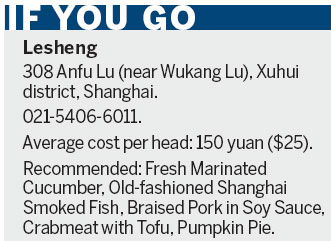Shanghainese restaurant with a Western twist
Updated: 2013-08-04 07:20
By Xu Junqian in Shanghai (China Daily)
|
|||||||||||
|
From left: Crab meat xiaolongbao, old-fashioned smoked fish, Shanghai-style dandan noodles. Photos provided to China Daily |
There is a saying in the Shanghai dialect which describes the situation of having the same ingredients boiled in a different soup, or put in English, old wine in a new bottle.
The saying may have a negative connotation, but it best describes Lesheng, the first Shanghainese fine-cuisine restaurant - positively.
Lesheng is named after David Laris, the Aussie-Greek star chef in the metropolis.
Housed in a two-story long and narrow space among a string of cafes, bakeries and Western-style eateries in the French Concession, the restaurant is elegant and nostalgic in its decor. Its interior reminds guests of the bedroom of a well-off Shanghainese woman in the 1930's.
The restaurant blends the contemporary style of Western dining and genuine flavors of traditional Shanghainese cuisine.
The fresh marinated cucumber is a good starter for the scorching summer, featuring an appetite-whetting sourness. The old-fashioned smoked fish is served hot, skin crispy and flesh juicy. It's best eaten with the accompanying sweet rich sauce.
It is believed that the benchmark to judge an authentic Shanghainese restaurant is by its red braised pork belly. But, the dish has its variations around the country. The more spicy version, for example, is from Hunan province and named after late chairman Mao Zedong. The Dongpo Pork is from Hangzhou, Zhejiang province, named after the famous poet and braised solely using yellow wine.

The pork at Lesheng is a Shanghainese variant. But the restaurant uses quail eggs instead of chicken eggs.
The pork is fat but not greasy, rich and moist with sweet glutinous sauce. The bite-sized fried quail eggs, an unusual ingredient in Shanghainese cuisine, come with crispy skin and do not make one feel too stuffed compared to having one whole chicken egg with the fatty pork.
For many gourmands, the best part of the dish is in the sauce, which goes well with a bowl of white rice.
A lighter option for what Shanghainese call "the hot dish" is the sauteed shrimp. Traditionally, the shrimp is a "cold dish" that face-loving Shanghai housewives only cook during festivals or big occasions to treat guests to show off that "we are so wealthy that we are even serving seafood as appetizers", although the shrimps served are usually small. The hot sauteed shrimps are as sweet as the cold ones, but the shells have been fried so that they can be chewed and swallowed together with the meat.
An unexpected dessert is the pear and pipefish soup, served in a white cuplike bowl. The sweet, thick, jellylike soup is a rare find on the city's traditional dining table as most Shanghainese restaurants prefer serving sticky rice as desserts. The soup provides a delightfully soothing end to the meal, a reminder of the restaurant's foreign pedigree.
xujunqian@chinadaily.com.cn
(China Daily 08/04/2013 page14)
Today's Top News
Germany ends info-sharing with US
25 policemen sentenced for massacre
Israel, Palestinians to start next round of talks
Mugabe wins presidential election
Shanghai judges probed for prostitution scandal
Recall of tainted milk products urged
Relaxation of one-child policy still being mulled
China, US hold dialogue on human right
Hot Topics
Lunar probe , China growth forecasts, Emission rules get tougher, China seen through 'colored lens', International board,
Editor's Picks

|

|

|

|

|

|






